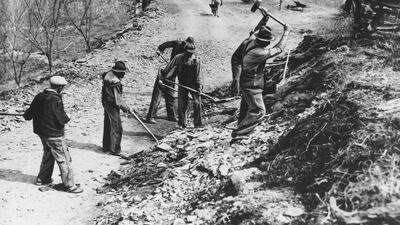The world currently faces four interconnected crises: public health, economic, energy and climate.
The number of unemployed Americans has increased to 30 million in the past month because of the coronavirus pandemic, wiping out all the jobs created in the past decade. The European Central Bank’s interest rate is at zero per cent and the US Federal Reserve is nearly the same. American oil prices recently went into negative territory.
These crazy numbers tell us it is time to focus less on anti-fossil fuel campaigns, and more on massive investment in a clean, new energy economy.
First, of course, we have to control the spread of the coronavirus and, hopefully, develop effective treatments and vaccines. Nothing constructive can happen until then. Once that happens, some countries will face the equivalent of recovering after an economic heart-attack, with mass unemployment, debt and corporate bankruptcies.
The International Monetary Fund said last month that the global economy was set to slide into the deepest recession since the Great Depression of the 1930s. Oil and gas exporters are enduring record low prices. The East Asian manufacturing giants will suffer while important markets in Europe and North America remain partially locked down.
Even before the Great Recession of 2008 to 2009, some economists argued the developed countries had entered a phase of “secular stagnation”, with slow growth because technological innovation was running out.
After the financial crisis, recovery was slow and patchy, and stored up problems of government debt despite or because of painful austerity, and social and regional inequality. In turn, these have yielded toxic politics, international hostility, trade barriers and populist leaders floundering in face of the virus. That experience cannot be repeated.
During the Great Depression, US President Franklin Roosevelt’s New Deal put a priority on infrastructure and energy. The Tennessee Valley Authority, set up in 1933, built dams and hydroelectric power stations through the south-east. The Hoover Dam on the Colorado River, then the world’s largest hydroelectric dam, was finished in 1936. The Rural Electrification Administration, established in 1935, took the share of farms with electricity from 10 per cent to 90 per cent by Mr Roosevelt’s death in 1945.
Before the coronavirus crisis, two New Deal-inspired environmental investment programmes had been proposed - the Green New Deal by some Democratic politicians in the US, and the European Green Deal to make the European Union carbon-neutral by 2050.
The Democrats’ agenda includes energy efficiency, smart grids, a move towards all renewable power, public transport, high-speed rail and clean manufacturing.
The European plan covers not just energy but also forest management and support to ensure farmers store carbon in soil, revitalise rural areas and revive natural habitats. It also includes carbon tariffs on imports from countries not managing their greenhouse gas emissions.
Similar initiatives are crucial, not just in the US and EU, but worldwide. The International Energy Agency estimates greenhouse gas emissions this year will fall by 8 per cent. Probably, 2019 will prove to have been the year in which carbon emissions hit an all-time high.
But emissions will first rebound from this year’s low level, before falling only slowly – too slowly to arrest the build-up of atmospheric carbon dioxide and hold global warming below 1.5 degrees Celsius.
Solar, wind and efficient gas power are now cheaper than coal in most locations. Nevertheless, coal power will continue to operate unless the funds are there to replace it. Coal mines provide local jobs and fund governments.
Climate rhetoric needs to shift. Environmental groups have pushed for laws to ban investment into fossil fuel projects. With Japan expected to join this movement, China is almost the last source of state financing for international coal, while the European Investment Bank’s policy, announced in November, effectively prevents funding even gas-fired power plants.
Commercial banks, insurers and equipment suppliers face pressure to withdraw from carbon fuels, with German industrial company Siemens confronting hostility in January over a relatively small contract to supply rail equipment to an Australian coal mine.
Yet, divestment campaigners have it exactly the wrong way around. Instead of trying to block fossil fuel investment, they should be removing the barriers to low-carbon energy. If a pension fund or a university divests from fossil fuels, it should commit twice as much to low-carbon technologies.
About $330 billion (Dh1.2 trillion) was invested in renewables in 2019. But the International Renewable Energy Agency in Abu Dhabi estimates this has to rise to $737bn annually by 2030 to meet climate targets. Governments do not have to invest all this themselves; they need to create the conditions to encourage private capital. Low interest rates and high unemployment create both the reward and the urgency to act.
In April, Shell and Equinor cut their dividends. In Shell’s case, this was the first time since the Second World War. This recognises the unique severity of the Covid-19 crisis. But it also frees up cash for investment in new growth areas such as offshore wind farms, electricity networks, batteries and hydrogen.
The role of governments is still essential. Prices for emitting carbon dioxide need to be imposed where they don’t exist and be raised where they do. The state should underwrite fundamental research and selectively pre-invest in areas such as surveys for offshore wind sites. Breakthrough technology needs finance, especially for the first large-scale demonstration projects such as advanced nuclear reactors, hydrogen production and low-carbon steel and cement plants, and new carbon capture systems.
Crucial infrastructure such as electric vehicle charging, hydrogen distribution, carbon capture hubs and high-voltage continental super grids needs government to lead. These massive, intricate projects require international co-operation to share the risk, to maximise value and avoid wasteful duplication. Our quadruple crisis outweighs the Great Depression in suddenness and complexity, but we can still learn from its solutions to build our own green future.
Robin M. Mills is chief executive of Qamar Energy and author of The Myth of the Oil Crisis


